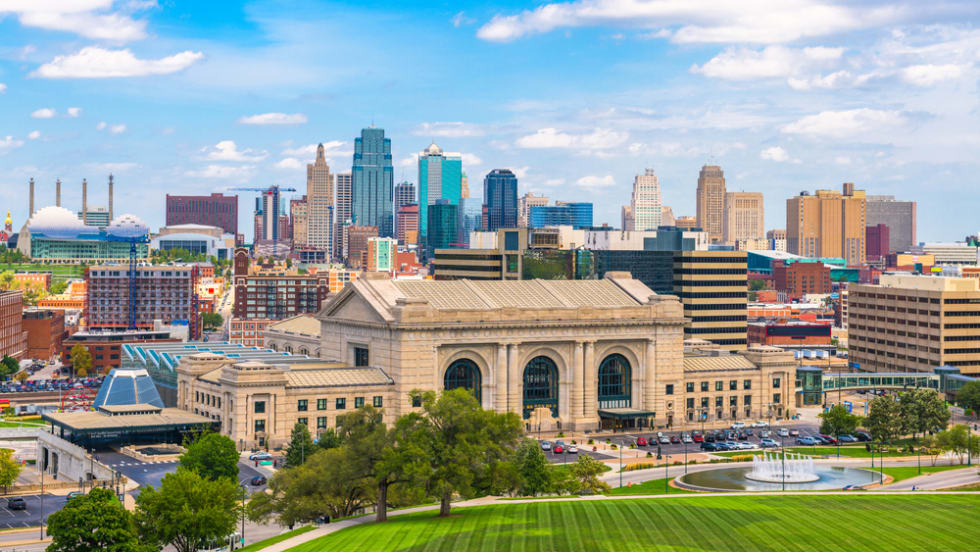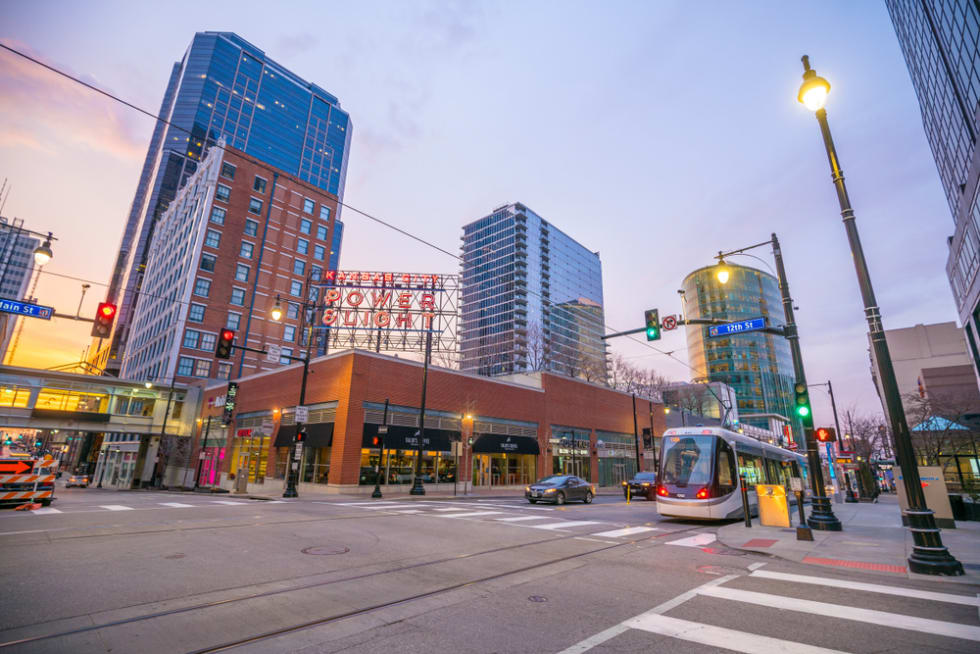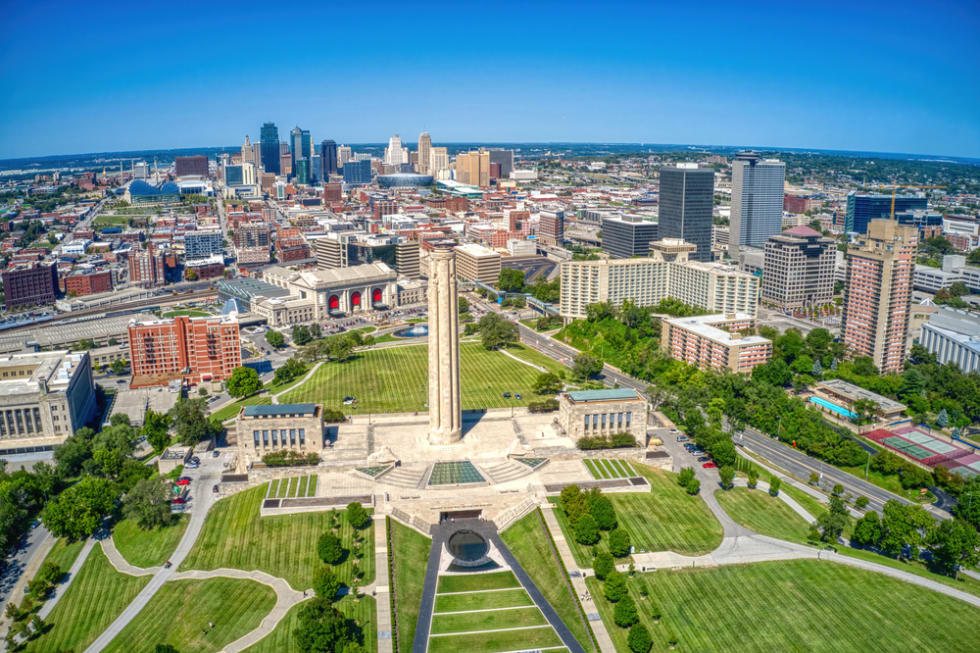- 163 units available
- Studio • 1 bed • 2 bed • 3 bed
- Amenities
In unit laundry, Patio / balcony, Dishwasher, Pet friendly, New construction, 24hr maintenance + more

Kansas City, most famously known for its ironic name, is a booming city with multiple nicknames like the Gateway to the Southwest, the City of Fountains, the Heart of America, the Paris of the Plains, and even the Barbecue Capital. With so much to offer in one city, it's no wonder the biggest city and second-largest metropolitan area in the Sunflower State of Missouri is such a popular place to call home.
If you're thinking about diving in and experiencing Kansas City hands-on as your new home, you want to get a better idea of your potential costs. Keep reading for a closer look at the cost of living in Kansas City to see how much you'll need to live there comfortably.
The cost of living in Kansas City is 0% less expensive than the average U.S. city, with residents spending around $4,399 a month to live there.
As of December 2024, the overall median rent in Kansas City stands at $1,307, after rising 0.1% last month. Prices and are now up 2.4% year-over-year. Median one-bedroom rates stand at $1,134, whereas two-bedrooms are $1,338.
The Kansas City housing market is also seeing steady growth, with median home prices currently at $458,688. Again, despite the significant increases, these prices still fall below the other popular cities like Boston, Philadelphia, and Chicago, with median home prices of $1,092,684, $490,563, and $692,764, respectively.

If you know what type of lifestyle you plan to lead in Kansas City, you can begin figuring out your recommended salary. You should not be spending more than one-third, or 30%, of your gross income on rent to live comfortably, according to the 30% rule. For example, if your rent is close to the median for a one-bedroom apartment in Kansas City and costs $1,134, your monthly wages should be at least $3,402 per month or $40,824 annually.
This recommended salary might sound easily attainable to you, but it is recommended for those looking to lead a very basic lifestyle, much like the living wage. Any additional costs for entertainment will mean that you'll need to pursue a higher salary, a less expensive apartment, or both.
Thankfully, the typical annual salaries for common professions in Kansas City are highly competitive. The three highest typical annual salaries belong to Management, Computer and Mathematical, and Architecture and Engineering, respectively.
The climate in Kansas City varies throughout the year. The area is known for tornadoes, which are most common in May. Otherwise, August is warm with some rainstorms. Winters range from December through February and tend to bring snow. The coldest month in Kansas City is January, with an average overnight low of 17.8°, while the hottest month of summer is July, where the average daytime high is typically 88.8°.
Since the winters are cold, with nights often below freezing, you'll need to account for higher utility bills, especially during these months. Kansas City's basic utilities include electricity, heating, cooling, water, and garbage, running $253.53 for a one-bedroom apartment. That's almost the same as the national average of $253.14.
| Location | Avg Electricity Cost | Avg Gas Cost | Avg Water Cost | Avg Fuel Cost | Avg Total Cost |
|---|---|---|---|---|---|
| Kansas City, MO | 148.58 | 62.46 | 41.50 | 0.99 | 253.53 |
| St. Louis, MO | 113.44 | 57.80 | 44.52 | 3.20 | 218.96 |
These costs can add up quickly over time, so rather than getting caught off guard, it's in your best interest to get a good idea of how much utilities will cost in an apartment before making your move. This information will help you to budget accordingly for this commonly overlooked expense.
If you prefer getting around with your vehicle, you can spend about $10,458 for transportation in Kansas City over a year as a single adult without children. A family of four, including two working adults and two children, will pay $17,542 for transportation in one year. Thankfully, gasoline prices are around $3.00 per gallon, much lower than the national average of $3.53.
The Kansas City Area Transportation Authority (KCATA) is the public transit agency in Kansas City's metropolitan areas. The KCATA operates throughout the city as the Metro Area Express (MAX) bus rapid transit service. It provides 78 local bus routes in counties throughout both Missouri and Kansas.
As of May 2020, KCATA launched the mobile app, Transit, for Apple and Android devices, making planning, tracking, and payment more effortless than ever for commuters. Thoughtfully plan out trips with step-by-step directions and notifications, track rides in real-time, and pay your fares paperless and remotely through the use of this new and improved app.
RideKC also provides users with a True Cost of Driving calculator to help you see more clearly what type of savings you can look forward to when utilizing the city’s public transportation system.
Kansas City didn't get the nickname the Barbecue Capital in jest. For the foodies out there who love a good barbeque meal, you've come to the right place. While any local might be willing to debate the best, you'll still want to check out some of the top favorites while living in Kansas City, like Gates Bar-B-Q, Danny Edwards Boulevard BBQ, or Hayward's Pit BBQ.
Thankfully, you can check out some good eats relatively cheaply, with an average of $18 for a meal at an inexpensive restaurant. If you're looking for a three-course dinner for two people at a mid-range restaurant, you can expect to pay around $77.50 without alcohol or dessert.
In Kansas City, single adults without children can expect to spend at least $4,441 on food per year. However, a family of four with two working adults and two children, can expect to pay $13,052 per year for food.
You can anticipate costs similar or slightly higher the national average for food items purchased from the local Cosentino's Downtown Market, Hy-Vee, or Sprouts Farmers Market. For example, one gallon of regular milk will run you $4.30 in the grocery store, with the national average being $4.00.
Regardless of where you are living, a top priority of yours, should be your health. When looking into the cost of living in a particular area, you'll want to find out more about the cost of healthcare so you can maintain your health.
Whether you visit your doctor minimally, or more regularly, having medical insurance in Kansas City will help keep your costs more manageable. Health insurance can help you afford the care you need should any unfortunate emergencies arise in your new hometown.
You will want to account for proper medical care when planning your budget in Kansas City, as healthcare should always be considered an essential cost. A single adult without children will pay around $3,079 for medical care over the year, while two working adults with two children will pay $8,197.

Kansas City has fitness and entertainment opportunities for everyone, especially those who like to be outdoors. However, winters will force you indoors, meaning you will likely need to join a local gym for workouts. Thankfully, these costs are relatively low, with a fitness club membership fee for one adult costing $46.84 monthly.
If you're looking for some entertainment, you can purchase a seat at the local cinema for $14.00 without snacks or drinks. Otherwise, you can hop on the KC Streetcar, which runs entirely free for over two miles through downtown Kansas City, including areas like the River Market, the Power and Light District, and the Crossroads Arts District.
Kansas City also has tons of other, more affordable entertainment options. You can visit museums, including the Nelson-Atkins Museum of Art, the National WWI Museum and Memorial, or the Kansas City Museum. The city also has several parks to enjoy for those who prefer to stay outdoors, including Penguin Park, Penn Valley Park, and the Jacob L. Loose Park.
Missouri is known for its progressive income tax and statewide sales tax, with additional rates per individual county and city. Missouri currently has a 4.225% sales tax, Jackson County adds another 1.4% on top of that, and Kansas City adds another 3.25% special tax making Kansas City's total sales tax rate 8.88%.
For anyone looking to move out of state to Kansas City, pay attention to additional costs that can also add up. Be on the lookout for extra expenses such as transportation, hotels, storage, and cross-country movers.
Extensive cross-country moves like this may require additional fees, like pet deposits, security deposits, apartment application fees, and other add-ons. Just be aware of these costs so you can prepare and adjust your budget as needed without having to tap into emergency funds.
You'll also need to furnish your new apartment, which is yet another often overlooked expense to consider. Thankfully, you can learn tips on how to decorate your apartment on a budget to help keep you in line.

Kansas City has a healthier job market compared to similar-sized metro areas. Today, healthcare is the leading industry in the city. The city's largest employers include Saint Luke's Health System, Children's Mercy, Truman Medical Centers/University Health, and HCA Midwest Health. Other significant employers are Cerner Corp., Hallmark Cards, and Ford Motor Co.
The unemployment rate in Kansas City is 3.7%, 0.3% below the current national average. Not surprisingly, this rate took a significant hit as a direct result of the pandemic. Thankfully, Kansas City is seeing a steady recovery as businesses begin opening once again.
Kansas City might be the place for you if you're looking to move to a vibrant city with countless indoor and outdoor activities. Register with Apartment List today and start checking out the thousands of available apartments to rent in Kansas City!
A one-bedroom apartment in Kansas City costs an average of $1,146 as of July 2024.
The cheapest average rent in Kansas City, MO is $1,146 for a one-bedroom apartment.
Kansas City is generally considered an affordable city, especially when compared to cities of a similar size. In Kansas City, rent starts at a low $991, and the median rent for a two-bedroom apartment sits at $1,153. Transportation costs in Kansas City amount to $5,305 a year for a single individual. Food costs $3,423 a year on average for a single Kansas City resident.
Kansas City is 248 miles away from St. Louis. It takes 3 hours and 50 minutes to get to St. Louis from Kansas City by car, 24 hours by bike, and 89 hours by foot.
Kansas City is 510 miles away from Chicago. It takes 8 hours and 10 minutes to get to Chicago from Kansas City by car, 46 hours by bike, and 164 hours by foot.
According to the U.S. Census Bureau, the population of Kansas City is 507,969. Kansas City is a medium-sized city in Missouri, not Kansas, as the name would suggest.
Kansas City is more expensive than El Paso, Texas. Kansas City’s median rent for a two-bedroom apartment sits at $1,171, while El Paso’s median rent for a two-bedroom apartment sits at $1,025.
Kansas City is more expensive than Saint Louis, Missouri. The median rent for a two-bedroom apartment in Kansas City is $1,153, while the median rent for a two-bedroom apartment in Saint Louis is $1,118.



In unit laundry, Patio / balcony, Dishwasher, Pet friendly, New construction, 24hr maintenance + more
In unit laundry, Google fiber, Patio / balcony, Granite counters, Hardwood floors, Dishwasher + more